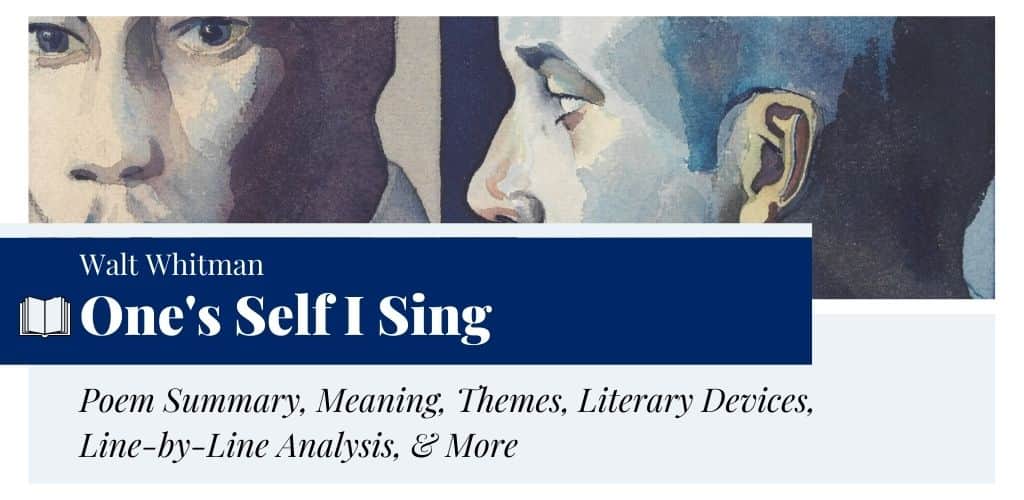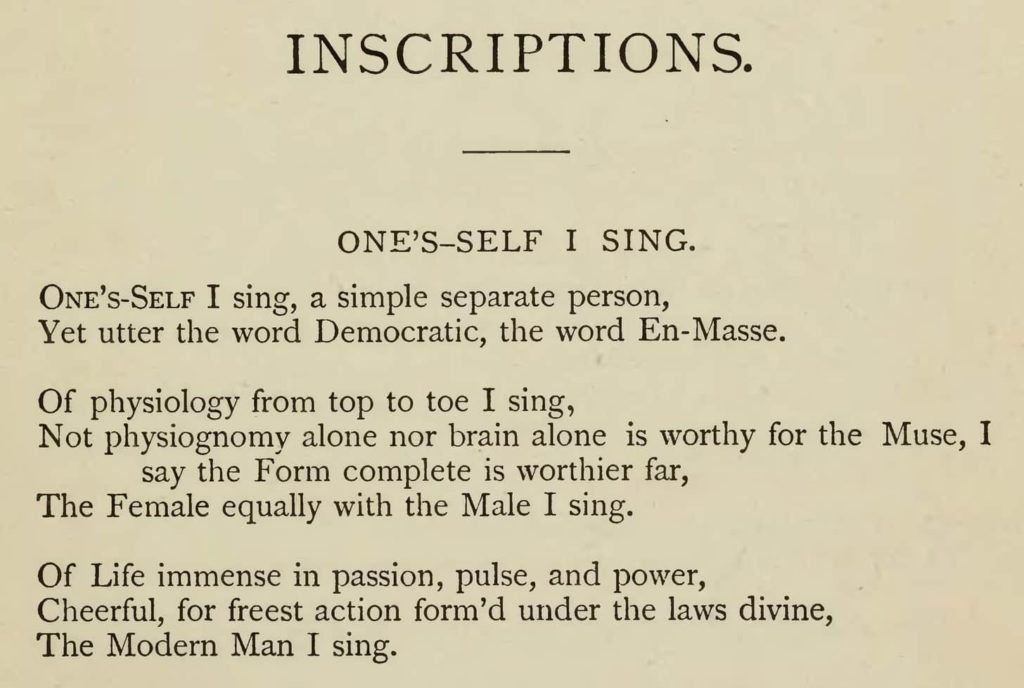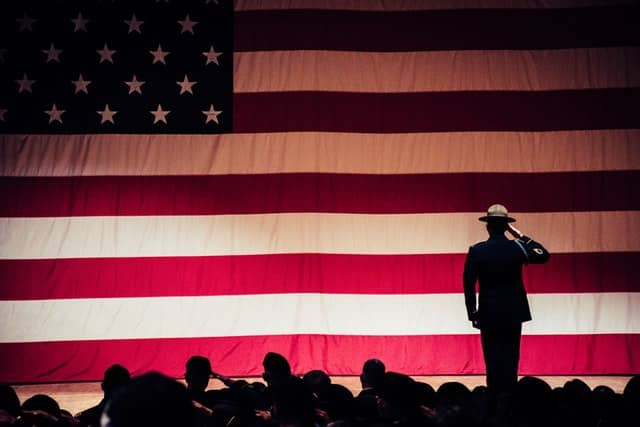One’s Self I Sing by Walt Whitman
“One’s Self I Sing” by Walt Whitman is a small poem of eight lines published in 1867 in his best-known collection, Leaves of Grass. The poem appears as the first poem for the final phase of the collection. Whitman sets the tone for the rest of the poems as he describes the themes that he will “sing” about in the collection. Leaves of Grass, as the title suggests, contains poems like the green grass, high and low, having differences between each small leaf of the grass to the other, yet all shoot from the same root. The overall collection discusses the themes of love, nature, soul, and spiritualism.
Walt Whitman was born on May 31st, 1819, in West Hills, New York, in a working-class family. He is recognized as the most influential and innovative poet of America, best remembered for his deeply rooted beliefs in democratic principles and his experimentation with the “truth.” Some of his most famous poems include “When Lilacs Last in the Dooryard Bloom’d,” an elegy for Abraham Lincoln written after his assassination.
- Read the full text of “One’s Self I Sing” below:
One's Self I Sing by Walt Whitman One’s-Self I sing, a simple, separate person, Yet utter the word Democratic, the word en-Masse. Of physiology from top to toe, I sing, Not physiognomy alone, nor brain alone, is worthy for the Muse, I say the Form complete is worthier far, The Female equally with the Male I sing. Of Life immense in passion, pulse, and power, Cheerful for freest action form’d, under the laws divine, The Modern Man I sing.

Summary

Whitman’s “One’s Self I Sing” appeals to the theme of self as an ode. In this poem, Whitman recounts “One’s-Self” as an individual and immediately expands his scope to “En-Masse,” emphasizing the nature of democracy and how it works. According to the speaker, his idea will surpass all the differences between the individual and the masses, the body and soul, men and women, spirituality and passion. The conclusion of the poem is that if we can manage and maintain harmony among the various facets of life; soul and body, men and women, freedom and law, we can achieve everlasting peace and strength in life.
Meaning
“One’s Self I Sing” is a short poem indicating the parallels between the different aspects of life, including body and the soul, men and women. Whitman describes how the balance between these can provide peace and harmony to an individual. In the first stanza, he describes how the “Self” differs from the person. He celebrates one’s individuality or self with due respect to democracy. Then he goes on the talk about what he seeks in a human being irrespective of their external features. His poetry always promotes equality and a genderless self. Lastly, Whitman taps on the idea of free will, essential for the development of the “Modern Man.”
Form, Rhyme Scheme, & Meter
This poem consists of nine lines. It conveys its meaning and intention despite being concise. The poem is full of contradicting ideas. Written in free-verse, it is truly a masterpiece and encompasses the poetry of its time. The first line is written in iambic pentameter, but line 2 can be seen as set in accentual” or anapestic meter. The poem can also be observed to be written in triangular-shaped stanzas, beginning with short lines, turning onto the bigger ones. The poet has used biological jargon (“physiognomy” and “physiology”) and past knowledge (“Muse”) to enrich this poem. It is full of rhythm due to the use of repetition, parallelism, and alliteration.
Literary Devices
In “One’s Self I Sing,” Whitman uses the following literary devices:
- Alliteration: It is the occurrence of the same letter or sound at the beginning of the closely placed words, like “passion, pulse, and power,” “simple separate,” and “The Modern Man,” and “top to toe” in this poem.
- Repetition: It is the repeated occurrence of a word or phrase throughout the text, as in the repetition of the words like “I sing.” It is repeated at the end of a number of lines for the sake of emphasis.
- Metaphor: It is the implicit comparison between two distinct ideas or objects. In this poem, “The Modern Man” refers to the American identity and the poet. The “Muse” refers to the poem itself. It is a metonym as well.
- Refrain: It is a poetic device where a word, line, or phrase is being repeated often at the end of consecutive sections. For example, the phrase “I sing” is repeated at the end of the second and third stanzas.
Themes
Human Body
The human body is a common theme in Whitman’s poetry. He sees the body as a communion of the mind and the soul. The individuals present a linking chain to the communal democratic self. Whitman believes in the ideology of a pure soul, stating that the human body is a vessel and the soul lives in it. Without the vessel, the soul cannot exist. Through the metaphors of the body and soul, he tries to focus on a much bigger picture, i.e., the relationship between the individual to communal democracy, how the idiosyncrasies of an individual also lead to the making of a harmonious society. Whitman seeks a democracy with fewer possible conflicts between individuals.
Gender
Whitman explores the theme of gender in many of his poems. He has the notion of treating both the sexes – men and women as equals, always complimenting each other. According to him, men and women are equal before his eyes, and no gender holds greater stature. Both the genders are sacred, irrespective of their physiological and emotional orientations. Both are the carriers of the life/soul. The soul is always neuter. Despite being called equals, women experience themselves in a disadvantaged position, often criticized and discriminated against. Through his poem “One’s Self I Sing,” Whitman wants to uplift and bring the women at par with the men and treat them as equals.
Line-by-Line Analysis & Explanation
Lines 1-2
One’s-Self I sing, a simple separate person,
Yet utter the word Democratic, the word En-Masse.
In the first two lines, tension is built between the individual and humankind. Whitman juxtaposes the “self” with the collective “En-Masse.” The phrase “en masse” means altogether. With respect to the poem, the term represents the entirety of the United States of America.
Whitman uses the words “simple” and “separate” to show the contradiction and disagreement between the “self” and an individual. By “simple,” he means a person with a child-like, inquisitive approach towards life. Whereas “separate” indicates the individuality and uniqueness a person exhibits when they are born. The poet wishes to be a “separate person,” yet integrated to “En-Masse.” He tends to have a “Democratic” approach along with retaining his characteristics of the unique “self.”
Lines 3-5
Of physiology from top to toe I sing,
Not physiognomy alone nor brain alone is worthy for the Muse, I say the Form complete is worthier far,
The Female equally with the Male I sing.
In the next lines, Whitman says he will sing of the human body (physiology) as a whole. Here, a tension between the body and the soul is built. The poet exclaims that he is grateful for his body and praises every cell of it, from “top to toe.”
“Physiology” is a branch of biology that deals with the functions of the human body, whereas “Physiognomy” deals with the outward appearances of the human body. So by using these terms, Whitman expresses that outward appearances like beauty, attractiveness, and intellectuality (brain) are not worthy of for the “Muse” or his poetry.
Here, “Muse” means a benchmark for a perfect poem and ideology. Muse in literature often refers to a sort of inspiration or an ideal figure one poet follows. So here in this stanza, the poet uses the term to refer to the combination of the outward appearance as well as the pure mind of an individual.
He says, “the Form complete is worthier far,” signifying the perfect amalgamation of the mind and the body. The body and soul are indispensable and inseparable; the body is the carrier of the soul, and the soul is an integral, immaterial part of the human body.
The line “The Female equally with the Male I sing” reveals the concept of gender equality cherished by Whitman. He treats men and women as equal entities despite being different physiologically. Whitman’s concept of gender revolves around the definition of soul, and souls are genderless, neutral.
Lines 6-8
Of Life immense in passion, pulse, and power,
Cheerful, for freest action form’d under the laws divine,
The Modern Man I sing.
In “One’s Self I Sing,” Whitman tries to speak out loud a very important message to readers through the concept of freedom and law. These two terms are highly contradicted as one cannot be entirely free under the law and law does not allow complete freedom or free will. The law prescribes and proscribes the conduct of citizens. However, Whitman believes that the absolute absence of law will lead to disruption of peace, safety, and order. Hence, he regards the “laws divine” that promote “freest action” as superior to the laws of men.
He ends the poem asserting that if one can have harmony of body and mind, men and women, individual and collective, freedom and law, there will be no obstacle in their life. Life will be filled with peace, strength, and happiness. “The Modern Man” signifies the ideal man, an image of the poet, implicitly referring to his idea of modernity. The last stanza wraps up by glorifying free will, divine laws, and Whitman’s “Modern” poetic sensibility.
Historical Context
Walt Whitman worked as a nurse during the American Civil War that timelines from 1861 to 1865 fought in the United States between the Union and the Confederacy. The horrors of the war inflicted an unforgettable pain on his heart. In his collection, Drum-Taps, published in 1865, he showcases the brutal experiences of war-torn soldiers. Whitman’s poems often center on both pain and healing, loss and reward, individual and whole. Leaves of Grass, a celebrated collection of Whitman, contains various poems, loosely connected, that unfold various areas like his philosophy of life, nature, humanity, spirituality, etc. The themes of most of Whitman’s poetry revolve around the human body, soul, and sexuality/gender, as evident in the poem “One’s Self I Sing,” published in 1867 as the opening poem for the final phase of Leaves of Grass.
Questions & Answers
In “One’s Self I Sing,” Whitman sings about individuality. His song celebrates the human body as a whole, the soul included. On top of that, he promotes a life of passion, pulse, and power that is ruled by divine laws. Lastly, Whitmans sings for the “Modern Man,” an implicit reference to himself.
In this poem, Whitman discusses the theme of the conflict between the self and the community, the body and the soul, the men and the women. His main idea revolves around the recognition of the “self” with respect to “En-Masse” and promoting free will facilitated by “laws divine.”
In this poem, Whitman states his belief in the purity of “self,” separate from the idea of “person.” Furthermore, he believes in the bodily “Form” that is complete and worthy in itself. In the last stanza, he tilts towards free will governed by divine laws.
It is a free-verse lyric poem that is written from the perspective of a first-person speaker, Whitman himself. It does not have a regular rhyme or meter. Yet, the poem sounds rhythmical due to the use of internal rhymings.
Whitman uses the symbols of “Self,” “Muse,” and “Modern Man” in this poem. The “Self” represents the human soul, “Muse” symbolizes poetry, and the “Modern Man” is a symbol for a reasonable, democratic mind.
In “One’s Self I Sing,” Whitman upholds the spirit of individualism in the very first stanza. He recognizes the “Self” (or soul) as a completely different person residing in a person. He sings for this entity with respect to “En-Masse.”
The title of the poem is a direct reference to Whitman’s ideology of individualism and individuality. He sings for “One’s-Self,” which is a reference to the soul. According to him, it is a “simple separate person” guiding the actions of a human being.
Whitman refers to the “Self” as a “simple separate person.” By “simple,” he means a child-like curiosity and innocence. In contrast, the term “separate” defines the distinction of the body and soul.
Whitman uses various literary devices like metaphor, alliteration, repetition, etc., to ignite the desired literary spark in readers.
The poem “One’s Self I Sing” was written around the American Civil War that lasted from 1861 till 1865. It was first published in the final phase of Whitman’s best-loved collection, Leaves of Grass, in 1867.
Similar Poems about “Self” and Identity
- “I’m “wife” — I’ve finished that —” by Emily Dickinson — This poem is about the tension in a woman’s mind. She is torn between two states, individualism, and womanhood.
- “What is Life?” by John Clare — This piece is all about the meaning of life and true happiness.
- “The Woman” by Kristina Rungano — In this poem, Rungano describes how a woman is treated in a patriarchal society.
- “A child said, What is the grass?” by Walt Whitman — This poem is about Whitman’s definition of the “grass” with respect to his collection Leaves of Grass.
External Resources
- Full text of Leaves of Grass (1882) — “One’s Self I Sing” appears as the first poem of the “Inscriptions” section of this collection.
- About Leaves of Grass — Learn about its publication history, different editions, and themes.
- “Individualism,” a Critical Essay — Read how Whitman approaches the theme of individualism in his large body of poetic works.
- About Walt Whitman — Learn about Whitman’s life, career, and works.
- Poet Profile & Poems of Whitman — Explore more about the poet and read some of his best-known poems.
- Check out the 150th Anniversary Edition of Leaves of Grass — This edition captures the style of the actual edition, best for the fans of Whitman’s poetry across the globe.




